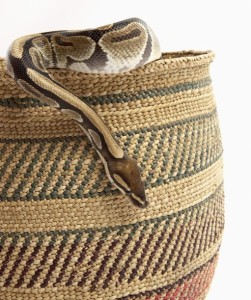
Classe paucis diebus erant decreturi. superabatur navium multitudine; dolo erat pugnandum, cum par non esset armis. imperavit quam plurimas venenatas serpentes vivas colligi easque in vasa fictilia conici. harum cum effecisset magnam multitudinem, die ipso quo facturus erat navale proelium, classiarios convocat iisque praecipit, omnes ut in unam Eumenis regis concurrant navem, a ceteris tantum satis habeant se defendere. id illos facile serpentium multitudine consecuturos. rex autem in qua nave veheretur ut scirent se facturum; quem si aut cepissent aut interfecissent, magno iis pollicetur praemio fore. tali cohortatione militum facta, classis ab utrisque in proelium deducitur. quarum acie constituta, priusquam signum pugnae daretur, Hannibal, ut palam faceret suis, quo loco Eumenes esset, tabellarium in scapha cum caduceo mittit. qui ubi ad naves adversariorum pervenit epistulamque ostendens, se regem professus est quaerere, statim ad Eumenem deductus est, quod nemo dubitabat quin aliquid de pace esset scriptum. tabellarius, ducis nave declarata suis, eodem unde erat egressus se recepit. at Eumenes soluta epistula nihil in ea repperit nisi quae ad irridendum eum pertinerent. cuius etsi causam mirabatur neque reperiebat, tamen proelium statim committere non dubitavit. horum in concursu Bithynii Hannibalis praecepto universi navem Eumenis adoriuntur. quorum vim rex cum sustinere non posset, fuga salutem petiit, quam consecutus non esset, nisi intra sua praesidia se recepisset, quae in proximo litore erant collocata. reliquae Pergamenae naves cum adversarios premerent acrius, repente in eas vasa fictilia de quibus supra mentionem fecimus conici coepta sunt. quae iacta initio risum pugnantibus concitarunt, neque qua re id fieret poterat intellegi. postquam autem naves suas oppletas conspexerunt serpentibus, nova re perterriti, cum quid potissimum vitarent non viderent, puppes verterunt seque ad sua castra nautica rettulerunt. sic Hannibal consilio arma Pergamenorum superavit neque tum solum, sed saepe alias pedestribus copiis pari prudentia pepulit adversarios.
(Cornelius Nepos, Hann. 10.4-11.7)
Within a few days they were intending to fight a decisive naval battle. Hannibal was outnumbered in ships; therefore it was necessary to resort to a ruse, since he was unequal to his opponent in arms. He gave orders to collect the greatest possible number of venomous snakes and put them alive in earthenware jars. When he had got together a great number of these, on the very day when the sea-fight was going to take place he called the marines together and bade them concentrate their attack on the ship of Eumenes and be satisfied with merely defending themselves against the rest; this they could easily do, thanks to the great number of snakes. Furthermore, he promised to let them know in what ship Eumenes was sailing, and to give them a generous reward if they succeeded in either capturing or killing the king. After he had encouraged the soldiers in this way, the fleets on both sides were brought out for battle. When they were drawn up in line, before the signal for action was given, in order that Hannibal might make it clear to his men where Eumenes was, he sent a messenger in a skiff with a herald’s staff. When the emissary came to the ships of the enemy, he exhibited a letter and said that he was looking for the king. He was at once taken to Eumenes since no one doubted that it was some communication about peace. The letter-carrier, having pointed out the commander’s ship to his men, returned to the place from which he came. But Eumenes, on opening the missive, found nothing in it except what was designed to mock at him. Although he wondered at the reason for such conduct and could not find one, he nevertheless did not hesitate to join battle at once. When the clash came, the Bithynians did as Hannibal had ordered and fell upon the ship of Eumenes in a body. Since the king could not resist their force, he sought safety in flight, which he secured only by retreating within the entrenchments which had been thrown up on the neighboring shore. When the other Pergamene ships began to press their opponents too hard, on a sudden the earthenware jars of which I have spoken began to be hurled at them. At first these projectiles excited the laughter of the combatants, and they could not understand what it meant. But as soon as they saw their ships filled with snakes, terrified by the strange weapons and not knowing how to avoid them, they turned their ships about and retreated to their naval camp. Thus Hannibal overcame the arms of Pergamum by strategy; and that was not the only instance of the kind, but on many other occasions in land battles he defeated his antagonists by a similar bit of cleverness. (tr. John C. Rolfe)
